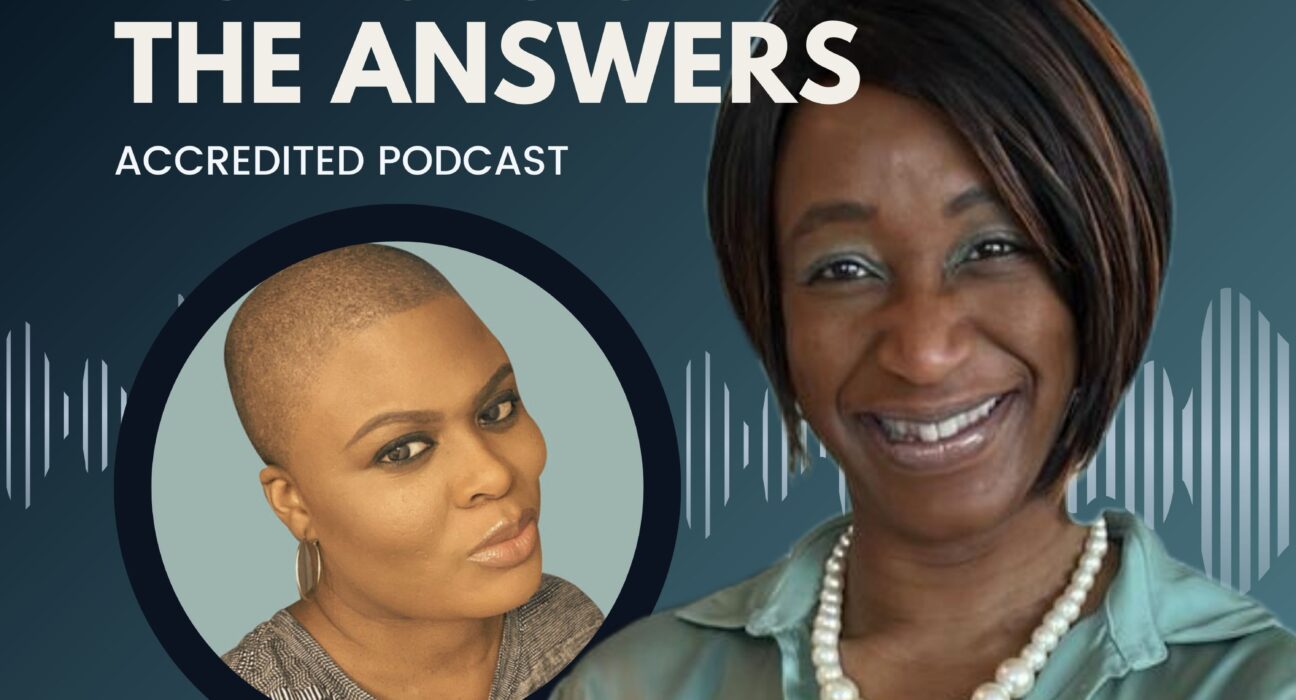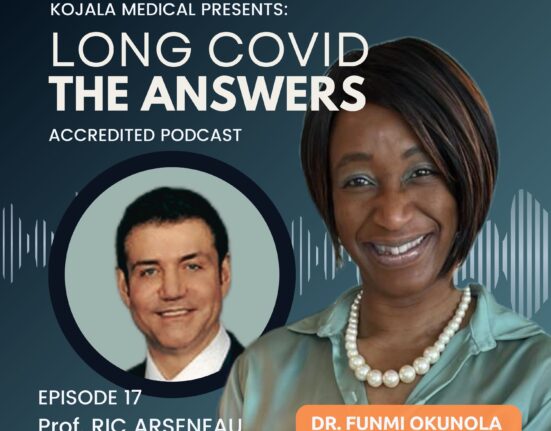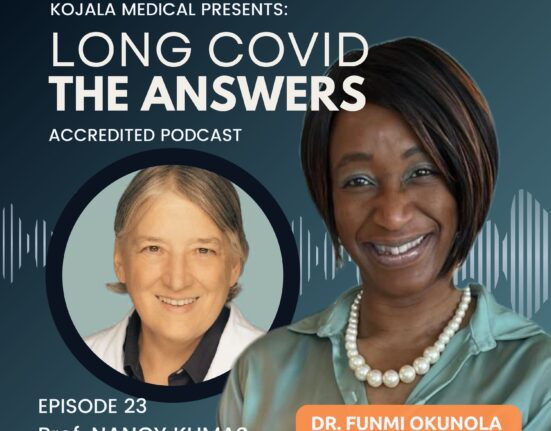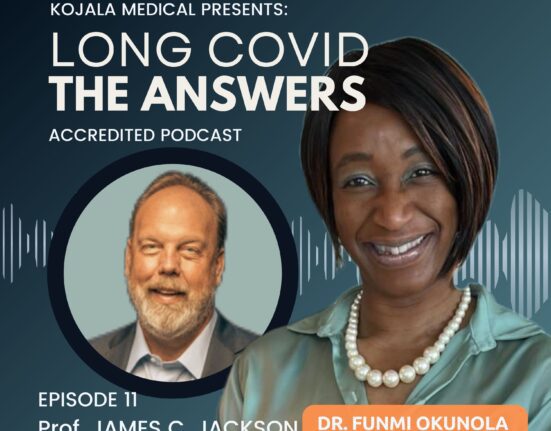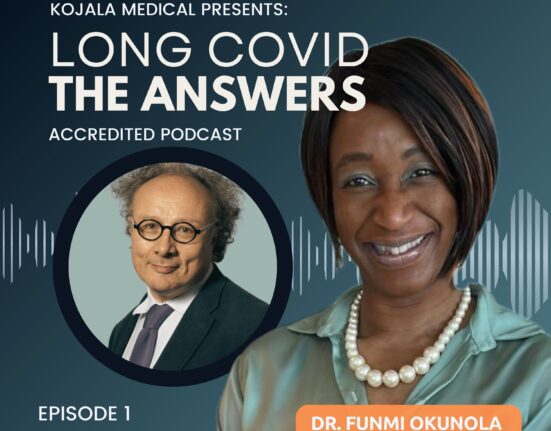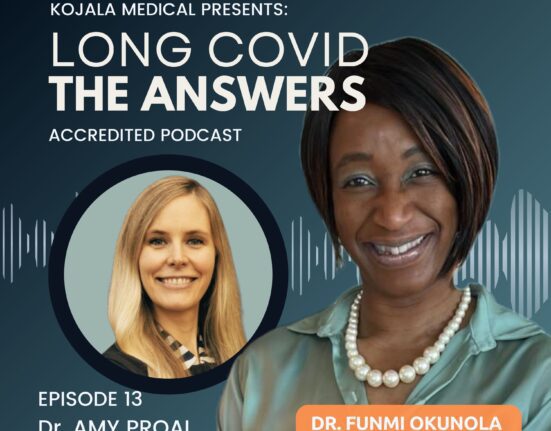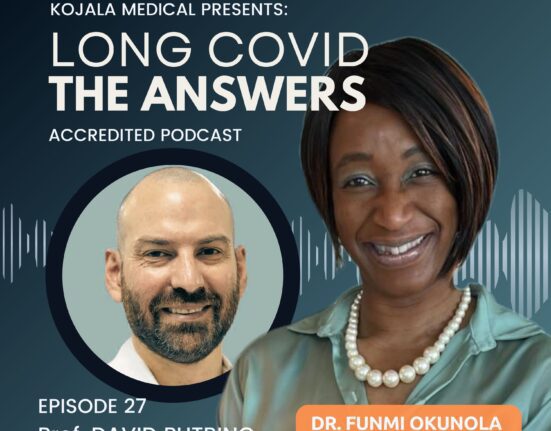
Listen to part 2 of Chimére Sweeney’s gripping story of resilience with long COVID. From healthcare gaslighting to finding strength in community, Chimére sheds light on underrepresented experiences in her journey toward recovery.
Guest – Chimére L. Sweeney
Note: The podcast has no bias. All conflicts of interest are highlighted with individual guests.
Healthcare Professionals | Earn 0.5 Certified Mainpro+® Credits! Please register/login to claim your CPD/ CEU credits.
Podcast Overview:
Chimére Sweeney, an award winning , former middle school teacher, writer, film producer, speaker, and long COVID advocate, is interviewed about her Long COVID story. This is the first of two episodes.
This powerful account details the relentless symptoms of long COVID, from chronic pain and cognitive decline to isolation and despair. Once an English teacher with mastery of language, Chimére now relies on support to communicate effectively. Chimére describes her struggle for medical validation and their experience of gaslighting in healthcare, highlighting the added challenges faced as a Black woman. Long COVID also emphasized a newfound reliance on community, challenging prior notions of self-sufficiency. Now focused on creating a documentary, Chimére aims to amplify the voices of Black long COVID patients, preserving these underrepresented stories for history.
DISCLAIMER: The information in this podcast is provided for informational purposes only. You should not use any information discussed in this podcast and related materials to make medical or healthcare related decisions. Always consult a your physician or other qualified health care provider with regards to diagnosing managing your medical condition. Any medications or treatments, including any discussed in this podcast, should be initiated and managed by a qualified health care professional.
Podcast Transcript:
Healthcare Professionals: Please note to claim Certified CPD / CEU credits toward your medical license (Canada & reciprocal CPD/CEU Worldwide), you will need to register or log in.
Episode 20 – Chimére’s Personal Long COVID Story and Advocacy PART 2 ft Chimére L. Sweeney
[00:00:00] Funmi Okunola: The information in this podcast is provided for informational purposes only. You should not use any information discussed in this podcast and related materials to make medical or healthcare related decisions. Always consult your physician or other qualified healthcare providers with regards to diagnosing and managing your medical condition. Any medications or treatments, including any discussed in this podcast, should be initiated and managed by a qualified healthcare professional
Funmi Okunola: Welcome to Long COVID – The Answers.
Today’s Episode is entitled “Chimére L. Sweeney’s Personal Long COVID Story and Advocacy”. I’d like to introduce Chimére Sweeney, an award-winning middle school teacher, writer, film producer, speaker, and Long COVID advocate. Chimére is a Long Hauler who has worked tirelessly to bring to light the effects of Long COVID on Black, Indigenous, and people of [00:01:00] colour.
Amongst the forgotten and unheard of many, she is a woman who is unafraid to speak the truth. Chimére has been a guest panelist for the National Institute of Health’s workshop on the effects of Long COVID following which the U.S. Congress provided $1.15 billion for the NIH research into Long COVID.
Chimére testified before the 2021 U.S. Congress House Committee Energy and Commerce’s hearing on Long COVID. She has also written for a variety of publications, including a chapter in the “Long COVID Survival Guide” edited by Fiona Lowenstein. Welcome, Chimére.
Chimere Sweeney: I’m so glad to be with you. Thank you.
Funmi Okunola: Chimére, do you have any conflicts of interest to declare?
Chimere Sweeney: No.
Funmi Okunola: That’s great. Okay. You’ve touched on your mental health, you touched on it earlier in the [00:02:00] interview, and also in the article, and you talk about how your mental health is affected by the virus and the circumstances of the pandemic.
I know the virus directly causes inflammation of the brain and the nervous system, reduction in serotonin. All of that has been shown in research that’s been done since you were diagnosed, and research still going on. Also, the circumstance of the pandemic, you’ve talked about the social isolation, (not) being touched for two years, and the toll that that has on your mental health.
Is there anything else that you would like to add to that and how you overcame those experiences?
Chimere Sweeney: Absolutely. Here’s where privilege shows up again because for two years, I was still employed by my job for the school system in Baltimore, and because I hadn’t separated from them at that time, because of the union fees that I paid, I still have access to their mental health, cognitive and [00:03:00] behavioral therapy.
When I realized that I needed a psychiatrist, I was able to tap into having a psychiatrist as well. That has been a wonder for me because I needed to admit once again that I needed help that was outside of me, that was external from me, and I needed to call on experts – people who understood who even if they didn’t understand the full extent of what COVID has specifically done, they understood what viruses can do to the brain, and they understood what chronic illness and the complexity of a chronic illness can do to the brain and to the emotional part of a person’s humanity.
I was already in therapy before I got sick, so I’m thankful for that. But the interesting part as you mentioned before about doctors and physician providers is that it’s a daunting [00:04:00] thing, and it’s also a very brave thing to do. Even in those spaces I’ve had to teach people about the implications of Long COVID simply because I’m alive and I exist.
Recently, because I moved to a new town, I had to get all new providers, and a few of them still don’t understand the impacts of Long COVID, and I am honored to be able to teach them. But now I’m at the point where I get tired of that because I’m like by now we know Long COVID affects every part of the body, every system in the body. So, I was able to get mental health therapy, and also tapping into a more spiritual side of myself where I just needed to change a lot of my personality and how I thought about things, how I saw the world, even my own disability and [00:05:00] others.
I still incorporate a lot of meditation into my own practice. I operate in a routine. I did it better the first two years where I would make these very, very explicit schedules of what I was able to do. Because there was so much I wasn’t able to do, I trained myself on a system that I created where I was incorporating reading back into my body’s diet. I was sleeping at a certain time. I was sitting up on the rails of my bed for thirty seconds with good posture because being off for like I said nine months, there were times I couldn’t sit up. I had to train myself to hear, and to see with poor vision. I had to [00:06:00] really be very intentional about my own care, my self care, and I know that there’s always this argument about the complex chronic illnesses, communities, thoughts about meditation, and what they call ‘brain retraining’ and things like that, and listen, I’m not here to change anybody’s mind about anything because I want people to believe as they believe. But I’m just saying that the meditation for me was helpful. It may not be helpful for another person. There are things that somebody has sworn to me that have worked for them, and I’m like it didn’t work for me. I can’t take naltrexone. Am I saying it right? I can’t take that. People have gotten relief, inflammatory relief because of it. I can’t take it. It’s harsh on my system, but I never want to say that something doesn’t work because it doesn’t work for one of us.
There’s lots of things, but those are things I had to do. I had to [00:07:00] rest a whole lot and I had to just walk myself into a schedule that was conducive for me.
Funmi Okunola: So, did you get help and support for doing that? Did you get help from physiotherapists, occupational therapists?
Chimere Sweeney: Do I advise that people do? Yes. That’s one thing I will say. I advise that people seek the help and the advisement of compassionate doctors who are educated. I always tell people, make sure you’re being treated by somebody who has treated Long COVID before, because I think a lot of times, we don’t understand how much power we had. What I’m researching for my film is that even our ancestors who were enslaved, they were, without even knowing it, doing things to practice agency over their bodies, even though they were owned and enslaved by other people, right? There are things that I always tell people, “You don’t have to be treated by a doctor who doesn’t treat Long COVID”. I say to everybody, “Do everything that you do under the guidance of a physician who knows how to treat Long COVID patients”.
Funmi Okunola: So, did you learn how to get better from your own research online, or did you have support from doctors, from rehabilitation physicians, advising you how to pace, how to schedule your time, or was it all self learned?
Chimere Sweeney: A lot of it was researched, and then the good thing about our community, though while we often don’t agree with each other, and complex chronic illness communities or disability communities, that’s the beautiful and sad thing is that each of us want something, and our governments can’t keep up with us. Science and research and government can’t keep up with what we imagine and what we want. These are all great ideas and we’re still working to get to them. I did a lot of research for me. I did so [00:09:00] much research that I have days where I look up stuff now because when you’re that sick, I looked up stuff that who knew, oh man, in 2020 or 2021, I knew everything there was to know – everything about everybody’s system, the interceptors and histamine and all these things. I knew so much because out of fear, I was reading every day.
Chimere Sweeney: But then I was thankful, and that’s what I love about our community of chronic complex illnesses is that we are for the most part, kind to each other. We’re compassionate. We meet each other in our humanity.
So, the ME/CFS community. I will never take this from them. That community, which I’m now a part of because I have ME/CFS, that community was so generous with their time, with their advice, with their offerings. We were meeting every week for a while. They were helping us to guide and gird us through, even going to the doctor and knowing what [00:10:00] to do and what to say, what test to ask for. They were very helpful. They already expected, sadly, that COVID would lead us here. So, they were ready with their advice. But for me a lot of it was before then trial and error.
There were sometimes that I would wake up, get up and sit, my back for thirty seconds, and I would be asleep for the rest of the day. I had to teach myself, okay, you can’t do it for thirty seconds but let’s do it for fifteen seconds until I got to where I want it, and I know that in our community we also have to take issue with graded exercise therapy.
So, I’m not telling anybody what to do. I’m not even scribing to that alone. I still had doctors. I still had community, but there was some of the things I was doing just because I didn’t know any better, and that ended up working for me.
Do you think that that’s why I’m probably operating at a baseline of seventy-five is that I wanted to do it, and then I also had a community of people who taught me to rest, stop [00:11:00] and pace the ME/CFS community, and I also was guided by doctors who were helping to manage some of those symptoms, and you know, stuff like that, so it took a village.
Funmi Okunola: Yes, as it does. Definitely. So, were there any specific medications that helped you with your recovery?
Chimere Sweeney: I’m not a doctor like you, so nobody should take this as me saying anything. Ajovy and Lyrica help because, as you know, there’s a lot of nerve inflammation, a lot of nerve damage that happens as a result of COVID. With the viral infection, the Ajovy helps me to manage the migraines because what I also have now as a result is occipital neuralgia
Chimere Sweeney: ..which is. It’s just nothing but an inflammatory response to a viral condition. Most of the time I’m saying I get a burning sensation. Depending on the day I get it, it feels like [00:12:00] something’s always like a brick or something is always in my brain. My skull, my face and stuff. It started off as trigeminal neuralgia, but thank God, thank God it just moved back. If I had to have one of the two, I’m glad I got this one. I have a lot of spinal issues now. So, I do go to the chiropractic doctor every two weeks. The Ajovy helps with migraines, and the Lyrica helps so that I don’t just die with nerve pain. A lot of medicines though, a lot of them. Myrbetriq for frequent urination, antidepressant, you know, Effexor, at a certain level because my psychiatrist recently said, “You’re making a film”.
She was like, I don’t want you to go down on the dosage because you are in a place where too much activity. Even when I got proposed to, I had a flare. I went into a flare because I was so excited. I was excited because Tory asked me to marry him, [00:13:00] and the next thing I was in bed for two days.
So, I’ve been put on an antidepressant to help manage my emotions, to manage my ability to be still first so that I don’t crash. I take Trazadone because we never get better. Restful sleep, but we need to sleep. So, I sleep. I take my Trazadone every night. These are things that have been helpful to me.
Ozempic now for the good or the bad of whoever thinks what. I have gained a lot of weight being sedentary, and so I had a fatty liver, a gastrointestinal issue. A lot of different things are going on, and I just was like, I’m going to try this, and because I’m also diabetic now my (Hb)A1c is a nice number. So, I had to do something that not only would help me manage my weight, but it [00:14:00] helped me manage how much insulin I needed in my body and the fatty liver because I was never a huge drinker or anything like that. Oh, actually I have my medicines right here.
I take allergy medicines every day. Singulair pills so that after eating I don’t scratch myself silly. So, it’s a lot of stuff. It’s more medicine than I’ve ever taken in my entire life. It’s more medicine than I want to take. But I have to take it because it makes some things manageable.
Funmi Okunola: Yeah, and I just wanted to hear your story. This in no way to the audience is a prescription of what you should take to deal with COVID because everybody that we’re finding at the moment has their own particular expression of the disease.
Funmi Okunola: And there’s a disclaimer at the beginning of the program. Please seek help from your own healthcare provider.
Okay. Do you have a carer? If so, how do you think she or he could be better [00:15:00] supported?
Chimere Sweeney: Like a caregiver?
Funmi Okunola: Yes.
Chimere Sweeney: A husband? Yes. My husband is. I’m grateful that he is, and my husband actually has caregiving experience because he took care of another family member up until their passing, his grandmother.
Chimere Sweeney: And So, I was panicked, like, how are you going to take care of me? And he was like, you know what to do, and so I had to, that’s also part of surrendering too. You have to surrender to your condition, and you have to surrender to those who want to help you. They need support too.
I can kind of tell when he needs a break. He’ll wash the dishes, he’ll cook the food, he’ll pack the food, there are times every weekend when he’s off, I’ll say, go play some video games, go out with your friends because he set me up so well with how he cares for me, but I also think that we need to do a better job. It’s going to happen as we find that there are more and more [00:16:00] and more people disabled, and who need care and need to be cared for by their loved ones or whatever.
We’re going to have to create more spaces for those people to be able to come out for play, and to be in the community with other people. We can sit and talk all day in a counseling session, but what else have you got? I need to play some basketball, ping pong, whatever it’s to be at play to enjoy. My husband is a little geek, and he loves anime and video games, and so I tell him that I’m okay and to go watch anime, go play, stuff like that. Write in your journal. I encourage him to keep a gratitude journal. I encourage him to think about himself too. So, there’s lots of things that he did that caregivers need to have. They need to have more information about what Long COVID really looks like, so we need to clarify that and really disrupt that [00:17:00] misinformation that’s still floating about and also take care of them because, as we know, statistically, the carer sometimes gets sick and passes away before the ill. I wasn’t aware of that statistically. Yeah, I’ve read things about caregivers, and they’ve said sometimes they pass away before you because there’s that level of stress. Eating properly, heart stress, cholesterol, all these different things that happen as a result of them caring for you, and they don’t care for themselves. So yeah, that’s what he does.
Funmi Okunola: Thank you for that. I was expecting an answer where you’d say, “Oh, the state needs to do this and that”, but you’ve actually said we who are unwell need to be mindful of our caregivers. That’s the way you’ve portrayed it, which is really interesting and very, very selfless. Thank you.
Chimere Sweeney: On some level I do believe that the goal for caregivers is to clarify and to [00:18:00] tell the real truth about what this looks like, right? We’re still not telling the truth, and sadly with the CDC in America and how they’ve quickly changed their tune about what it looks like, how long to be distancing, just all this information that’s infuriating because it’s not true.
Funmi Okunola: Yeah. It’s not scientific.
Chimere Sweeney: It’s not scientific. Thank you. It’s capitalistic, but it’s not scientific. We need to start telling the truth for our caregivers, people who actually have to leave their jobs to care for their loved ones. We need to have them know exactly what it looks like.
Because every day isn’t sunny over here. You know what I mean? So, but also in the emotional and psychological aspect of it, we need to remind these people about counseling and being at play and putting some distance between their titling as a caregiver. You know what I mean? Sometimes I do.
Funmi Okunola: Thank [00:19:00] you. We’re getting to the end. COVID-19 hit BIPOC communities very hard, particularly in the first wave of the pandemic. Yet I’ve seen very little research targeted to these communities in Western countries. How do you think the medical profession should go about including Black and Indigenous people of color into their research studies on Long COVID?
Chimere Sweeney: This question just really infuriates me because it’s not that hard. We always want these profound answers and it’s not that hard. First of all, we need to account and be accountable to the fact that for almost centuries now, over a century, that oppression has robbed and scared Black people, Indigenous and other races and ethnicities of people away from science, and we need to remind those same people ways [00:20:00] in which they have been scientific even if they didn’t know that what they were doing was scientific.
Enslaved people planting and creating places where trees and vegetables grow and other things that they use to heal each other. That’s scientific. So first you’ve got to be accountable. Second of all, you’ve got to tell these people that this is what science was even though I tried to scare you away from it, because in my research about ancestral connection, I’m the one of the first things, one of the books I’m reading, Gretchen Long and her book, “Doctoring Freedom”.
There was an intentionality to create this huge divide between enslaved people and science research. That’s why we don’t want to be a part of it because nobody actually has acknowledged that we know more than we think we know, and there was this wrong about how we were treated in it, which is why we don’t advocate.
We do less of the advocating [00:21:00] and we won’t go to an NIH to get studied. Also, we need to think about what the time cost is for me to step away from my job or step away from my children, my family, my community. What’s that cost for me? And you need to think about the fact that without the privilege, I don’t have the privilege of saying, “Hey, let me take off, I need to be paid seriously for my time”.
I just listened to a woman, “Healthy Voices”, a program by Johnson & Johnson. This woman is a Black, profound woman who can tell you all about research and how to get more Black and Indigenous people in research. Why are you not talking to her? She’s got the answers. I said “That’s who you need to be talking to. You’ve got to go to the schools, the community [00:22:00] centers, the churches, because that’s where you’ve got your best shot for the most part of reaching out to people. Use the money that you got. You’ve got over a billion, 2 billion. Go to those places and say, I need your help”.
Every time you tell them you need their help, our help for this and that, pay them for it, feed them for it, and then you can take a quick survey – ask quick survey questions to get what you want. No, it’s not usury. It’s just education, but you’ve got to know who you’re dealing with, and we pretend a lot of times that getting our people is so difficult.
It’s only difficult because you made it difficult, and you want it to be perfect. It isn’t going to be perfect. It’s going to be a lot of clap back and drawback. But what would you rather have? A study where you need one hundred people and you’ve got ninety-seven white people, or would you like a study with [00:23:00] one hundred people and you’ve got at least ten or more Black people, ten or more Indigenous people, and ten or more Latino people because that’s what the world looks like.
Then that’s the thing, another thing. We don’t look at what our world looks like. We’re still operating from a place of the majority rules. That’s not true. In twenty years, we won’t even have a majority. So, your research needs to look like the people that you claim you want to help – all of us, especially the ones you don’t get.
Funmi Okunola: Thank you so much. You were fantastic. Your courage, your focus, your commitment in advocating for Long COVID are more than truly appreciated, and we are so grateful that you could make it here today. Is there anything else that you want to say or add now that we’re at the end of this?
Chimere Sweeney: Yes. I’m in the process of creating a documentary. I’m in the very early stages of pre-production and it is called “Black and Unbelieved”. I’m finding Long COVID care [00:24:00] through ancestral connection, and all that means is that I am going to be not only going to talk to people in America and maybe Canada. I’m talking to people who have Long COVID, hearing their stories, to tell that story, but also finding out and researching ways and meeting people who are historians, who are raw food dietitians, who have their finger on the pulse of medicine and viral illnesses.
People who have treated COVID and Long COVID before, and just doing some research on how our ancestors advocated so successfully for their health care, even in ways that we would never expect. So, I’m telling the Long COVID story. I’m also poking fun at myself for having an ego about advocacy, which I got rid of really quick. Then also just looking at doing more ancestral connection and relying on our cultural memory to help us advocate for [00:25:00] our health care right now.
Funmi Okunola: Oh, thank you, and do keep us posted on that so we can continue in your journey. Thank you so much. So, thank you listeners and do join us next week for another Episode of Long COVID –The Answers.
Funmi Okunola: Some questions for listeners to consider.
What are your top five takeaways from this Episode?
How will this Episode change your practice or perception of this disease?
What will you do to act on what you’ve learned?
Please discuss your thoughts on our social media outlets such as Twitter or X, our website blog, Instagram, Facebook, LinkedIn.
Please rate this Episode.
SHOW NOTES:
Chimére Sweeney, an award winning , former middle school teacher, writer, film producer, speaker, and long COVID advocate, is interviewed about her Long COVID story. This is the second of two episodes. Episode 19 (Part 1)


